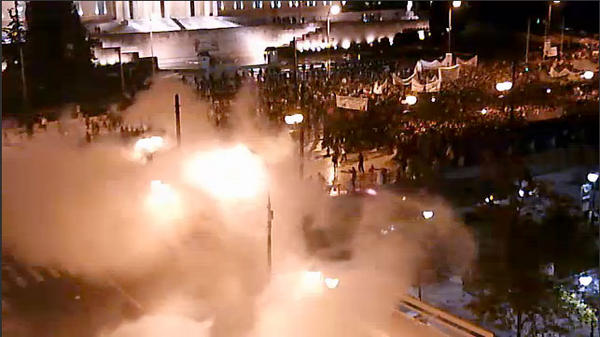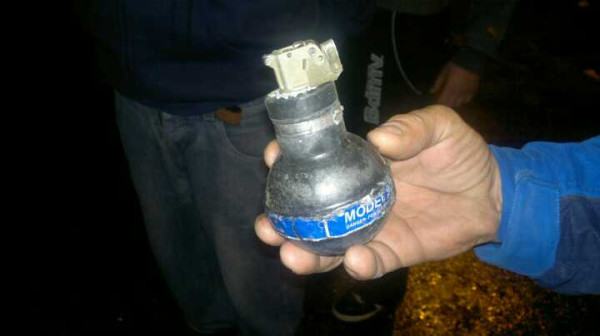The post-Sandy crisis can be understood as an intensification of austerity. The result of the storm has been to render New York into a version of Madrid or Athens (with no disrespect to the citizens of those great cities). Increasingly, debt is the means of eliminating what little democracy there is within the representative system, even more than it is the agent of what Naomi Klein calls “disaster capitalism.” What Europe has discovered is that you can’t vote out the debt system. Call it the autocracy of austerity.
And so, we kept the insane misogynists and climate deniers out, which was a necessary and good thing to do. But after the consultation with the state of Ohio as to who is in charge of austerity, the US establishment has returned to its favorite game of cutting benefits and programs to service sovereign debt, as if no interruption had occurred. In Athens yesterday, yet more cuts were voted in against the popular will. The European and Mediterranean social movements are unifying around a platform of resistance. We should join them: ¡No Debemos, no pagamos!
Today in New York: 15,000 school children sat in buildings without heat in 40 degree weather. Gas was rationed, because even though the entire planet is run for the benefit of the fossil fuel companies, they can’t get it together to deliver their product. Only 25% of the city’s gas stations are open in the largest city in America. 100 city housing projects out of a total of 400 still have no power. Up to 40,000 are homeless. FEMA is currently proposing to pay for only 75% of storm-related damage to utilities, leaving householders to make up the rest on increased bills. And on and on.
In Greece yesterday, the Troika got their tame coalition to pass tax increases, cuts in benefits and so-called “labor reforms,” meaning a reduction in workers’ rights. The Greek left, which is now working together in a bloc, reacted furiously calling a two-day general strike and Athens became a battleground. I wonder which US manufacturer made the tear gas?
Across Europe, this policy of co-ordinated resistance is growing. There will be a general strike across national borders on November 14. At the 99 Agora meeting held in Madrid from November 1-4, the conclusion was clear:
Debt is the major domination tool of the system.
This key axiom was developed into a statement as follows [translation slightly modified]:
Lack of democracy in Europe has allowed that, under the threat of debt, people’s basic rights are being violated. We denounce the agents responsible for emptying democratic institutions of popular sovereignty. We point to transnational corporations, especially international banks, for grabbing wealth through the payment of interest and the privatization of public companies in strategic sectors.
We already know that government debt was not acquired for the benefit of the people. We therefore consider it illegitimate debt and will not pay. The link between debt, austerity and privatization is clear.
We consider it urgent to end the growing impoverishment of the people and ensure that all can cover their basic needs, as reflected in the Universal Declaration of Human Rights; housing, food, healthcare, education, employment and social services. We call on social movements working on protection of these rights to coordinate protest actions and build alternatives together.
We know that the EU economic policies being implemented are not intended to improve the welfare of the people, neither in mid or long term, and we look at our sisters in the South, whose suffering must serve as a lesson.
Debt abolition requires transnational popular mobilization around a common agenda, just as capital has its transnational agenda. 99 Agora proposed an international agenda of action, education and networking. It’ll be developed in Florence in the days to come at the Firenze 10+10 conference. A calendar of days of action has been suggested, from the G8 meeting in London to the World Social Forum in Tunisia.
In this country, Strike Debt affiliates are active nationwide and the People’s Bailout is almost here. Small traces of resistance against the behemoth of global capital: yes. Isolated and without possible future: no.


